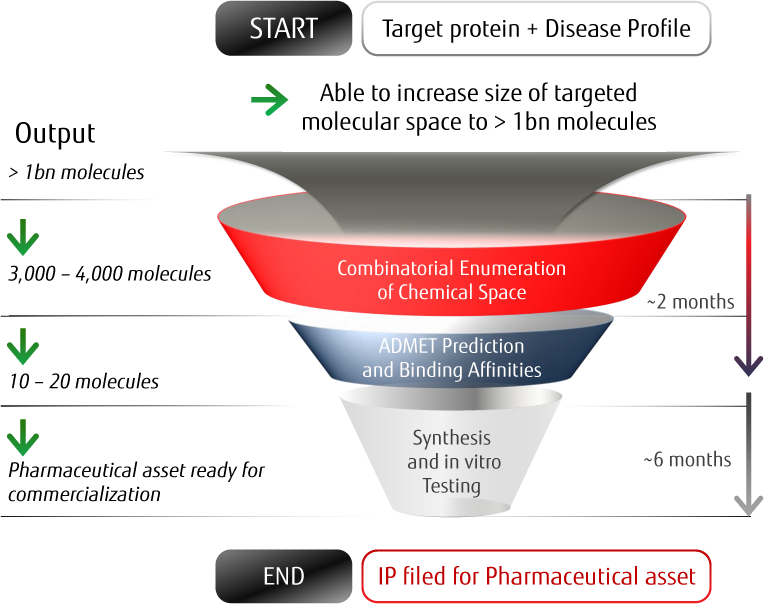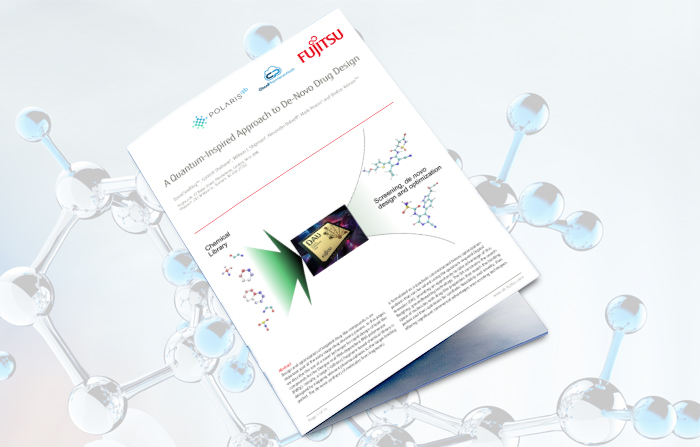Accelerating Drug Discovery – Delivering novel molecules in 7 weeks
With a 12-15 year drug development cycle costing up to US$2bn*, it’s essential the pharmaceutical industry applies disruptive innovation faster than ever before.
Diseases can spread more rapidly, as we’ve seen in 2020, putting greater pressure on the need for faster & better drugs, to cure possibly life-threatening diseases.
Our new quantum-inspired platform brings together pioneering technology to significantly improve the speed and quality of small molecule lead discovery - delivering novel molecules in 7 weeks, reducing the timeline for drug discovery to approximately 8 months.
The innovative platform will scan for, and ultimately identify, the lead de novo molecules needed to develop drugs to cure diseases having the most significant impact around the world.
Benefits
Significant time &
cost savings
Delivering novel molecules in 7 weeks, reducing the timeline for drug discovery to approximately 8 months.
Higher quality lead
molecules
Higher accuracy predications from a virtual molecule library of over 1 billion (from 0.5-10 million molecules)
Faster speed to market of novel,
patentable molecules
Novel, patentable lead molecules, ready for synthesis & in-vitro testing, enabling quicker speed to market
Insights & News
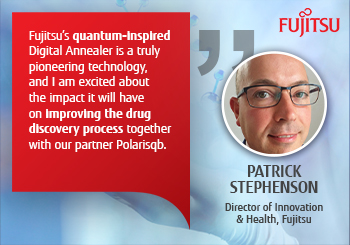
Fujitsu’s Director of Innovation & Health, Patrick Stephenson, talks about viral diseases’ threat to society and how technology can help fight it.
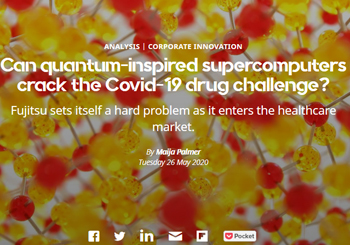
Can quantum-inspired supercomputers crack the challenges facing healthcare? Here’s why Fujitsu’s new drug discovery platform may have the answer
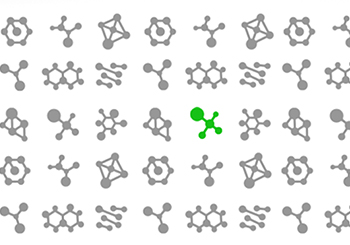
Alongside Polarisqb, Fujitsu designs a pioneering drug discovery platform to speed up the process of bringing new drugs to market.
Our solution: How does it work?
- The platform identifies lead molecule candidates from a targeted, diverse virtual library of several billion molecules and assesses their quality.
- Leads are evaluated using the structural information of the pharmaceutical target and a set of physicochemical constraints, such as ADMET.
- The platform leverages an annealing based molecule filter harnessing the computing power of Fujitsu’s Quantum Inspired Technology.
- The output is then refined and ranked with Polarisqb's machine learning algorithms for physicochemical properties, and QM/MM simulations for binding affinities.
- The final output is a short-list of high quality molecules prioritized for synthesis and in vitro testing.
The science behind the solution
Design and optimization of targeted drug-like compounds is an important part of the early stage drug discovery process. In this paper, we describe the use of a novel technique for rapid design of lead-like compounds for the Dengue Fever viral disease.
Abstract from the paper:
Initially, a large (>billions) fragment-based chemical library is designed by mapping relevant pharmacophores to the target binding pocket. The de-novo synthesis of molecules from fragments is formulated as a quadratic unconstrained binary optimization problem that can be solved using the quantum-inspired Digital Annealer (DA), providing an opportunity to take advantage of this fledgling, ground-breaking technology.
The DA constrains the search space of molecules with drug-like properties that match the binding pocket and then optimizes for synthetic feasibility and novelty, thus offering significant commercial advantages over existing techniques.
Our experts
Patrick Stephenson
Director of Innovation & Health, Fujitsu

Patrick is focused on how digital technology can transform the citizen experience, improve operational efficiency and drive inclusive social/economic value. Patrick is recognised as a digital innovator and a trusted advisor in public service digital transformation.
"We are looking forward to scaling this platform to tackle many more diseases in the future, enabling new drugs to be brought to patients faster and more cost-effectively."
Dr David Snelling
Fujitsu Fellow

Dave has a track record of theoretical and practical background being a Lecturer in Computer Science for more than 10 years before starting at Fujitsu Laboratories of Europe, the Research company of Fujitsu prior to his move to the CTO Office at Fujitsu.
Dave has been leading the work with PolarisQB to develop the platform and is very excited about the impact it will have on improving the drug discovery process.

